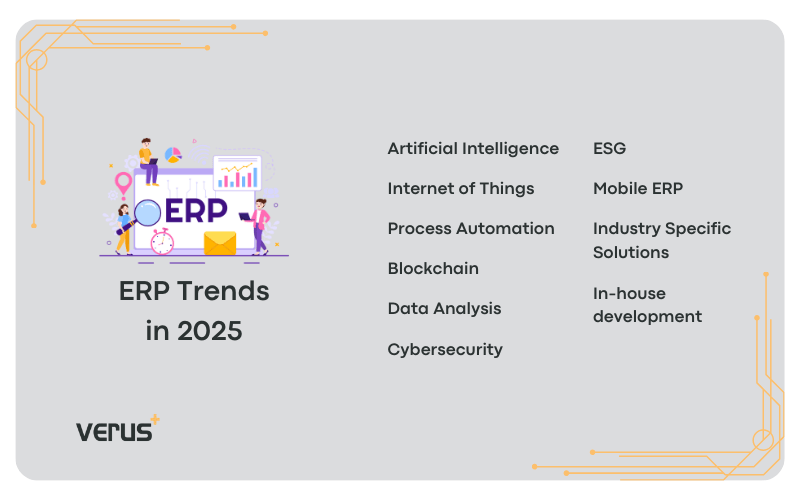
Artificial Intelligence in 2024: Trends and Statistics
15 November 2023
How TMA saved up 227 workdays in 3 years
13 December 2023There are two types of businesses. Those who innovate, and those who don’t.
The first are viewing ERP as a tool to gain valuable business insights and streamline operations. They are willing to invest a significant portion of their capital to improve their processes and dedicate more of their time to productive tasks.
The second, are viewing it as an obligation.
You clicked on an ERP trends article, so I imagine you either work or own a type 1 business. This is more important than you probably think it is. With the increased competition in today’s market, only the companies that innovate and improve their workflows will survive and grow in the following decades.
So, let’s dive deeper into the 10 ERP trends that will define 2025.
New ERP Trends in 2025

1) Artificial Intelligence
With AI, companies have transformed repetitive ERP processes, saving valuable time. Artificial Intelligence embedded in the ERP can automate tasks like:
- Invoice entry
- Demand forecast
- Order entry
- Data analysis
- Employee onboarding
- Information/file search
- Content creation
- Summarization and more.
For example, Copilot in Business Central can provide new employees step-by-step instructions on their tasks, allowing them to be productive from day one.
2) Internet of Things Integration
In 2025 companies are prioritizing ERP connection with IoT devices.
IoT sensors capture critical environmental data, such as temperature, humidity, and other warehouse conditions, ensuring optimal storage environments. This continuous data feed helps businesses make immediate adjustments, protecting product quality and safety.
With predictive analytics integrated into ERP systems, companies can monitor equipment health and anticipate malfunctions before they occur. Scheduled maintenance based on real-time data minimizes machine downtime and extends the lifespan of critical assets.
This proactive approach not only enhances operational efficiency but also ensures consistent product quality.
3) Business Process Automation
Modern enterprises are automating repetitive processes with Robotic Process Automation (RPA), through tools like Power Automate.
Whether it’s regular workflows like document management, approvals and reminders, or custom ones, Power Automate can accelerate key daily tasks and reserve company resources for more productive activities.
4) Blockchain
While blockchain’s adoption in ERP systems might still be considered more of a future prediction than a present trend, the shift is inevitable. In 2025, we expect an increasing number of businesses to integrate their ERP systems with blockchain technology to improve data security and integrity.
With the use of smart contracts, key documents—such as contracts, invoices, and transaction records—will be permanently recorded in a tamper-proof ledger. This immutability not only minimizes the potential for fraud but also reduces disputes by ensuring that once data is validated, it cannot be altered.
Blockchain’s decentralized nature ensures that all stakeholders have a single, verifiable source of truth. This increased transparency can streamline audit processes and simplify compliance reporting, making it easier for organizations to adhere to regulatory requirements.
5) Data Analysis
Organizations today understand that data is the lifeblood of their operations. It fuels performance monitoring and strategic decision-making, making detailed reporting and analytics essential components of modern ERP systems.
Tools such as Power BI are embedded within ERP systems to offer dynamic, real-time dashboards. These analytics solutions provide actionable insights, allowing companies to track key performance indicators (KPIs) and identify trends that drive growth.
Data-driven insights support strategic planning by highlighting areas for improvement and opportunities for expansion, while comprehensive reporting ensures that every decision is backed by accurate and up-to-date information.
To top it all off, Power BI is integrated with Copilot’s AI capabilities, automating data consolidation, visualization and analysis, freeing up valuable time for strategic purposes.
6) Cybersecurity
With the average cost of a data breach hovering around $4.88 million, companies are compelled to invest significantly in advanced cybersecurity measures. As cyber threats become more sophisticated, ranging from ransomware attacks to deepfake scams, businesses are deploying AI-driven threat detection systems and adopting zero-trust architectures to safeguard their data.
7) ESG and Sustainability
Modern ERP systems are evolving to incorporate ESG tracking directly within their frameworks. This integration not only streamlines sustainability reporting but also enables organizations to monitor key metrics (such as carbon footprints, energy consumption, and waste management) in real time.
By embedding sustainability into daily operations, companies can meet regulatory standards, improve stakeholder trust, and create long-term value through responsible practices.
8) Mobile ERP Apps
Most company activity isn’t limited to the office. Warehouse employees, salespeople, and field technicians cannot have constant access to the ERP.
However, they need to view critical data to complete their tasks. At the same time, they have to enter new data into the system as soon as possible.
This is where the usability of mobile applications fully connected to the ERP lies. With Power Apps, businesses can develop custom mobile apps that can function even while offline and update the ERP when they connect to the internet again.
These applications can help with processes like managing inventory, sales opportunities, service cases, and more.
9) Industry-Specific Solutions
ERP vendors are now developing industry-specific modules that come preconfigured with best practices for sectors such as manufacturing, healthcare, retail, and logistics. These solutions reduce the need for extensive customization, expedite implementation, and ensure a higher return on investment.
For instance, manufacturers benefit from advanced supply chain and production planning tools, while retailers gain from omnichannel inventory and customer relationship management features. By leveraging these targeted solutions, organizations can achieve greater operational efficiency and a competitive edge in their respective markets.
10) In-house development
Thanks to advancements in Artificial Intelligence and low-code/no-code platforms, like Microsoft’s Power Platform, businesses can now develop custom applications, automations, websites, and even virtual agents that seamlessly integrate with their ERP systems.
Verus+ is an experienced Business Central consultant that can help you implement 2025’s ERP trends in your business.
Book a free consultation with one of our experts so we can analyze your needs and present to you the best digital transformation solutions that will skyrocket your business’s performance.





